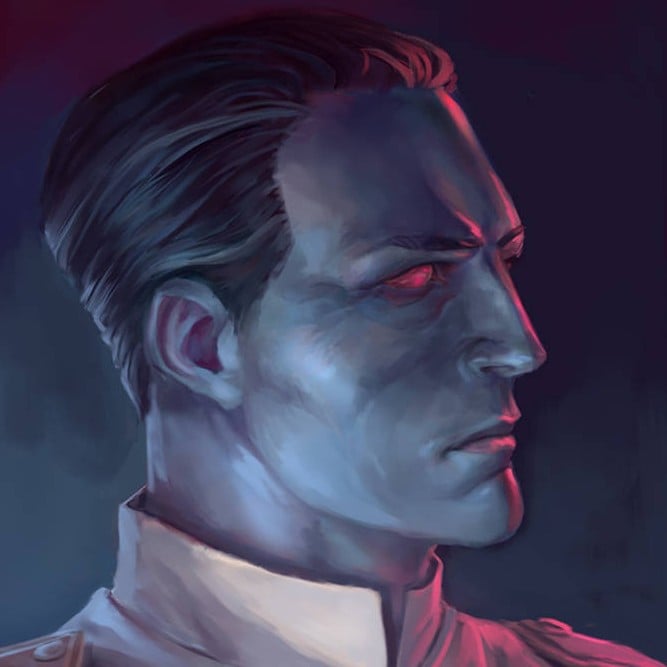Love them or hate them there are a lot of common tropes across the science fiction genre. What are some of your favorite and least favorite tropes?
I think it goes without saying that one of the least favorite tropes is Deux ex Machina. I couldn’t quite put my finger on it at first, but after watching the German TV show “Dark” I was utterly dissatisfied with it. The entire series up until the very last episode is about this inescapable time loop and alternative universes which is pretty cool while watching it, but then you get closer and closer to the end wondering how they are going to solve this impossible problem. Then surprise they just do it instantly in the last episode.
Another trope I am not very fond of is nanotechnology where there are trillions of tiny robots that can effectively act as magic. It just feels like a lazy way to write science fiction because you really want a fantasy.
A trope I do actually like despite how overdone it is, is the idea of a precursor or forerunner. It often brings to light the absolutely massive scale of the universe which I find fun to think about.
A trope that I hate is that every alien planet or moon has the same gravity as Earth. Yes, I love The Expanse.
Bonus round: planets with one biome: ice planets, forest planets, storm planets. I left out desert planets, praise the maker.
Also, every alien culture being uniform! Why does every Klingon have the same customs? Where are the equivalent of Russian Klingons and American Klingons and Chinese Klingons, etc?
While Planets of Hats definitely do exist, this one is more excusable for me because I think that it would be possible for the distinctions between individuals of an alien culture to be overwhelmed for the characters by the sheer unfamiliarity of the culture as a whole. And as far as national-scale distinctions, the characters may not interact with a very diverse range of people from the planet, maybe they have one or two crew members being from there, or maybe they visit once specific site on the planet rather than traveling widely across it.
I can often excuse single-biome planets this way, too. For example, Hoth. Sure, Hoth is an “ice world.” But I bet if you were to actually map out Hoth’s climate you’d find that it has regions that range from “Antarctic” to “Colder than Hell” to “Holy Shit Steel Shatters Here” and the Rebels just wisely put their base in one of the “Antarctic” regions. Tattooine and Arrakis likely range from “Sahara-like” to “Sandblaster Inferno” and we just see the characters in the “Sahara-like” places.
One of the best subversions of this that comes to mind is an episode of Stargate SG-1 where a couple of characters get shunted to an unknown Stargate that’s buried in an ice cave. When one manages to reach the surface to find a howling snowstorm and an ice sheet stretching as far as she can see she reports back that “we’re on an ice world, it’s uninhabitable, there’s no way there’s any life here. We’re on our own” And then it turned out that they were literally in Antarctica, on Earth, and eventually a rescue helicopter shows up.
What I’d really like to see is a desert planet with a small sea at the pole to provide a habitable biosphere around it, and when we actually see a city down there it looks like a perfectly ordinary green landscape with trees and wheat fields and whatnot. Because on the scale of a planet you can easily have a region the size of Great Britain that’s lush and green while still having the world as a whole count as a “desert planet.”
I’ll just drop this here.
I feel like you read my mind. I was just having this same thought the other day while driving. In the Star Trek universe humans are this very diverse group of people with all kinds of attributes and feelings and desires. Then you get to the Klingons or the Vulcans and somehow they are practically homogenous culturally, emotionally and in beliefs. I find that extremely unrealistic. There are different Klingon factions, but I can’t even comprehend what their problems are with each other because they all believe the same things and have the same goals.
I still love Star Trek though. I just wish alien species were more than plot devices.
What about the Ferengi with their union warfare and feminist revolution, and the Cardassians with their internal divisions over soverignty vs power?
Hm, I guess my personal theory is that by the time Deep Space Nine was airing, the viewers were already aware of the Ferengi, Cardassians, and Klingons to where they could get away with having factions and differing cultural views.
Then again, they even created a bit of a divide inside the Dominion which was completely new, so who knows. Maybe the DS9 show runners just knew how to handle it better.
You just see less of each planet when you’re boldly going where no one has gone before. On first contact, the chance of only meeting one culture is higher, since you’re only talking to one group. If you talked to two cultures of the same species, it’d be more like second contact. That’s why the Cerritos sees more of each culture than the Enterprise. Captain Freeman witnessed a political revolution on humanity’s first visit to Pakled Planet. Captain Janeway only found out about political division among the Q after humanity had known Q for a while. And Worf got involved in a conservative religious movement on Risa. You’ve gotta know the mold before you can buck the mold.
Deep Space Nine stayed in the same place for 7 seasons, so there was TONS of interaction with the same cultures again and again. That’s why we got to see their diversity.
A trope that’s bothered me more and more over the years is planetary chauvinism. So many science fiction settings make the assumption that people will only ever live on planets - and usually specifically Earthlike planets - and anything else is just something for a mining ship to visit, when it’s even thought of at all.
A somewhat related issue is the grand importance that Earth always seems to be given. I can understand it from the perspective of writing stuff for the general audience, it’s super easy to make them care about whatever’s going on by saying “oh no, Earth might be destroyed” but once we’re a couple of centuries or millennia into being a spacefaring civilization with colonies all over the place Earth is going to be just one planet out of many. Star Trek is a particularly bad offender here since not only should there be plenty of human colonies just as big and important as Earth at this point but there are dozens of nonhuman Federation members too. The Federation didn’t end when Vulcan got destroyed, it shouldn’t end if Earth gets destroyed.
For the second concern i like the two Hainish Circle books i have read, “The dispossessed” and “The left hand of darkness”. They mention that something like earth exists, but it’s not even a plot point, it’s just another planet. But then again these books are social commentar / thought experiment first and foremost, they just happen to be in a Sci-Fi setting.
Necroposting to suggest the The Culture books by Ian M. Banks. The vast vast majority of people live on big space habitats like ring worlds, O’Neil cylinders, and Stanford Torii. Also some of the hugest ships carry basically a whole planet of people.
That almost every alien species is bipedal and hominoid in shape.
You might really like the book The Final Architecture. The author has very imaginative ideas on alien species that basically share nothing in common with humans biologically.
Are you referring to the series with Shards of Earth by Adrian Tchaikovsky?
Yes. Shards of Earth, Eyes of the Void and Lords of Uncreation are all The Final Architecture trilogy. I had a great time with them.
One of the worst examples of the Deus Ex Machina has to be Battlestar Galactica.
I actually tried watching Battlestar Galactica awhile back, but the religious themes made me drop it far before the end. I’m glad I did if it turns even more into something I wouldn’t enjoy.
I actually dropped it a few episodes in due to the extreme shaky-cam space battle scenes. Every once in a while I’d reconsider watching it but the things I kept hearing didn’t seem compelling, and then after I heard how it ended I was very glad I’d made the choice to stay away.
I guess this leads to another “trope” (I don’t know if it’s really a trope so much as it is bad planning) where a series is advertised as having a grand story arc or deep mystery that’s unfolding as the series progresses. I’ve been burned by these so often that even though I love that sort of thing I now take it as a signal to avoid the series until it’s well and truly finished so I can find out whether the showrunners really did have that or if they were just lying through their teeth to keep viewers engaged.
I enjoy well done religious themes in sci fi and fantasy. It can either be completely goofy, and that’s enjoyable in one way, or it can give a moment of “i wonder what the journey between what we have now and what they have looks like”. Take for example Neon Genesis Evangelion; what the hell happened?
With Neon Genesis Evangelion the religious themes are almost entirely visual only or just something Anno thought was cool rather than making any actual statement. In Battlestar Galactica I started to feel like I was being preached too and then instead of the logical conclusion of their baseless beliefs about things being wrong the whole time it turns out they were right. The show was just not for me I guess.
The Outside has the best religious themes. The galaxy is ruled by superintelligent AIs who call themselves gods and feed on human souls to maintain their sentience. A scientist who hates the gods and thinks reality is fake is punching holes in reality, bringing in Lovecraftian monsters, and sending random people mad or killing them. The protagonist is tasked by the gods with hunting down this scientist, and she’s stuck in the middle of this ideological war between two different religions in which both sides are scientifically correct in their religious beliefs, and yet the beliefs are totally incompatible and one must be destroyed.
Damn, that sounds amazing, how have I never heard of this before? That’s going on the ‘to read’ list for sure
Oh also 90% of the characters are either queer, neurodivergent, or both. The hero is an autistic lesbian scientist. The book takes the Lovecraftian trope of “Gazing upon creatures from beyond reality drives you mad” and updates it to the modern day with correct ideas about mental health and a genuinely informed perspective on what it’s like to be neurodivergent. Also it’s full of gays
This is maybe only tangentially related, but my most hated recent trend in genre fiction is “Your Fantasy story is actually Sci-Fi”.
Numenara/The Ninth World is probably the most popular example (and I almost give it a pass for ingenuity), but it seems to be the go-to for trashy low-budget fantasy and webcomics; and it’s also really popular in fan theories (Game of Thrones and AtlA being big examples). And there’s always media that sort of straddles the line between the two (the new She-Ra: Princesses of Power show being an example; fantasy themes, sci-fi setting).
Of course, you could say the same thing about Star Wars. But I guess the difference, to me, is that Star Wars is unabashedly Sci-Fi. She-Ra tries to hide its Science Fiction behind of veneer of Princesses and pseudo-magical superpowers.
Another trope I am not very fond of is nanotechnology where there are trillions of tiny robots that can effectively act as magic. It just feels like a lazy way to write science fiction because you really want a fantasy.
Agreed completely.
Honestly this thread went through a lot of ones that I love/hate but one trope I can’t get enough of is “the aliens are uncaring” like in Roadside picnic where they show up, throw some trash down on earth, and leave. They are never seen or heard from, they don’t even bother with us in the book.
There is another series with a deus ex machina where some AIs evolve into godlike beings and then just mysteriously leave, but I forget the name of that one as well.I think it goes without saying that one of the least favorite tropes is Deux ex Machina. I couldn’t quite put my finger on it at first, but after watching the German TV show “Dark” I was utterly dissatisfied with it. The entire series up until the very last episode is about this inescapable time loop and alternative universes which is pretty cool while watching it, but then you get closer and closer to the end wondering how they are going to solve this impossible problem. Then surprise they just do it instantly in the last episode.
Except they didn’t just do it in a single episode. If you watch carefully, you would have realized that Adam & Claudia had been working their whole lives to get up to that point. None of it appeared out of nowhere, even with the fact that the climax happened in an instant.
I don’t know how common the trope is, but since reading Accelerando i love the idea of extending your mind with computers. It starts with the MC sending AI-Agents to research tasks in the beginning of the book (something thats not that unrealistic nowadays), to most of a humans “thinking power” being outside their head.
“The precursor” is also always great. I loved the “broken earth” trilogy for that, most of what i remember from it is about finding out what the precursors did and how their artefacts worked.
What I dislike isn’t really a trope, but it’s when an author expects me to believe that future populations are stuck in the present cultural climate. A lot of old scifi books have aged really poorly because their authors could not imagine society moving forwards at all, so their societies of the future just seem dated. “The stars my destination” is like this imo.
I recently read the first Foundation novel as well as most of the second. Asimov was clearly not envisioning a more egalitarian future when he wrote about housewives destabilizing society when their appliances break and they can’t get them fixed or replaced.
I honestly lost a lot of interest in continuing the series just because of that, but I also couldn’t get attached to any of the characters since it zips around in history so quickly. I get that civilization itself is supposed to be a “character” of sorts, but that just doesn’t appeal to me.
I did like the first season of the show, however.
Oh that’s too bad, I was actually looking forward to reading those books soon…
Did they modernize it in the show?The show diverges pretty heavily from the books, but the part of the books that @RoundToo@kbin.social is referencing hasn’t been reached yet.
When they constantly invent names for shit that already exists. It’s OK here and there but you don’t need to rename every little thing. It makes what’s actually happening hard to follow.
Anathem did this very well; it was weird enough that it felt alien yet familiar enough I didn’t really have to look anything up and it felt, well, real, without awkward pronunciation or phrasing. That and LOTR since it actually had a logical phonology and complete grammar. Helps that JRR was a linguist.
I fell in love with an book series called Expeditionary Force, the first book Columbus day hooked me. It’s fun, it’s interesting, and the writer does an amazing job making the technology being discuss sound realistic and not too far fetched.
With that being said, ExFor has ruined space battles for me in Sci-Fi and made me realize a trope we all just took for granted - The Dog Fighting type of close combat you see in ship to ship battles in Sci-Fi. There just isn’t any way that would ever play out that way, instead combat would happen at ultra far ranges, so far apart, that railguns could be dodged, even lasers and other high energy beam weapons could be evaded just by moving out of the way as light crawls along. Combat would be about bracketing your target with fire, and ultra fast, high g smart missiles.
Space is so insanely large, that you’d never see dog fighting like in Star Wars.
Whenever “this universe” versus “that universe” comes up I always look at one thing for space battles. Effective Range.
Why would Mass Effect ships absolutely dick on Halo ships? Because their weapons fire ten times faster which means they can literally side step enemy rounds while landing them all. Day. Long.
Nothing else matters when you can just casually avoid everything your enemy throws at you.
My biggest peeve in this context is when the official “technical specs” for ships and other technologies have ludicrous numbers that make no sense with what we see on-screen. Star Wars is a big offender here, their ship weapons are often said to deliver shots with “kiloton” or “megaton” yields but when they actually show the shots hitting unshielded matter (such as a strafing run hitting the ground or shooting asteroids) there’s just the equivalent of a few kilograms of TNT popping off. Yet people pull out those megaton numbers when “battleboarding” as if that’s more relevant than what we actually see on screen.
Star Wars and their 5768392845792919375859391957583929194873939293875 ultrabiggajoule shields lol yeah.
No one working on star wars understands energy, laser shots do what modern missiles and bombs can, those aren’t even close to the thermonuclear yields that turbolasers supposedly have.
It’s not just energy numbers, though that’s very prominent. Star Wars writers just have no sense of scale.
AT-ATs are listed as having a maximum speed of 60km/h. I would love to see an animation of one of those things actually managing to gallop along at that speed, it would look so goofy.









